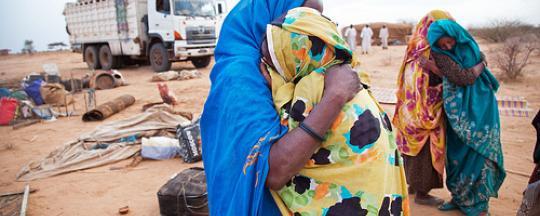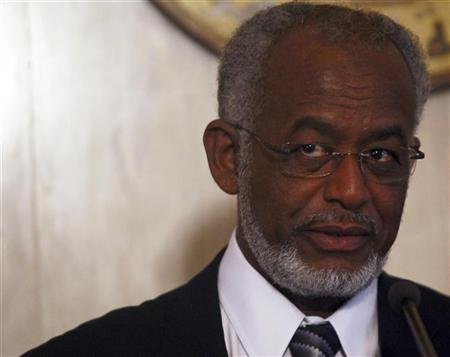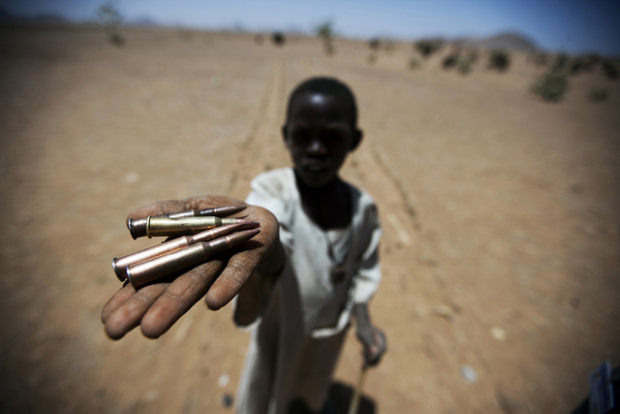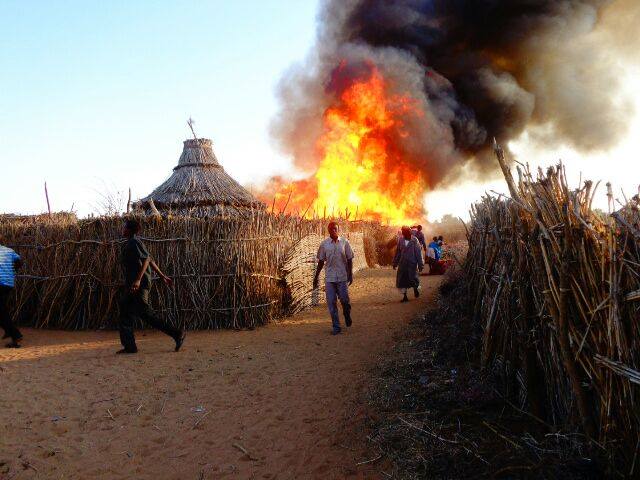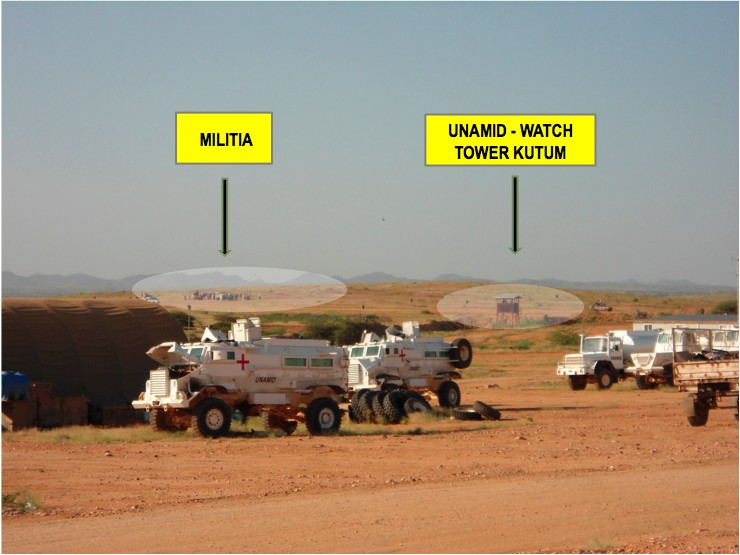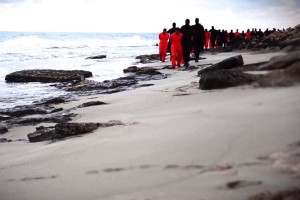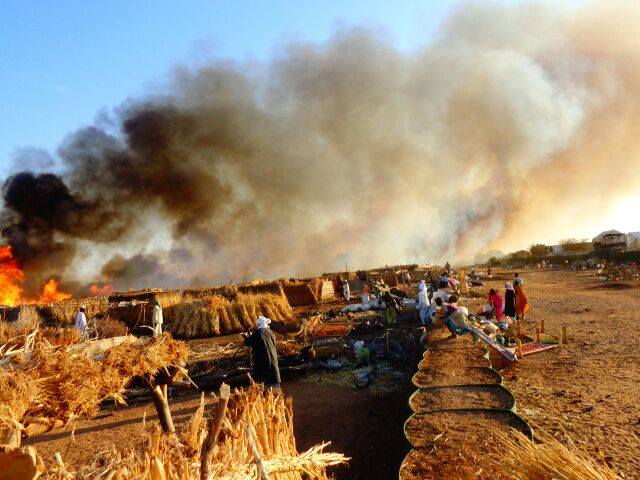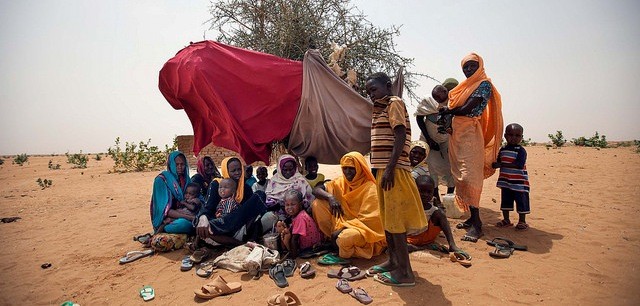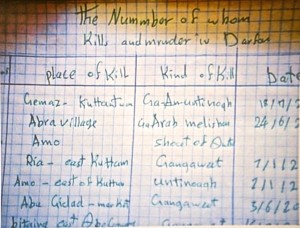This is the third installment of a digest containing what I believe to be the most important stories reported by Radio Dabanga in the previous week. Radio Dabanga has been by far our most important and reliable source of information about what is occurring in Darfur, and provides far more than the UN/African Union Mission in Darfur (UNAMID), the UN Office for the Coordination of Humanitarian Affairs, and the largely worthless quarterly reports of the UN Secretary-General.
This reflects most fundamentally Khartoum’s continuing intimidation of the UN—and thereby the nongovernmental humanitarian organizations with a continuing presence in Darfur. They realize that if they were to get ahead of the UN in reporting on conditions in Darfur, they would be immediately expelled. A raft of topics are not to be discussed publicly or reported in formal fashion: a realistic account of the epidemic of rape that continues to sweep across all of Darfur; human mortality (the last UN estimate—300,000—was a full seven years ago and did not reflect key data that was available at the time or has subsequently become available; malnutrition (although an internal document from UNICEF was leaked and published by Nicholas Kristof in the New York Times; the level of humanitarian need in various areas, including Jebel Marra, where there are high levels of morbidity; and other defining features of the lives and livelihoods of Darfuris. This self-censorship is the major reason the world knows so little about the continuing human catastrophe in Darfur, and why Radio Dabanga is so important.
As a news source, Radio Dabanga is the most popular in Darfur and North Kordofan, which should tell us something. But there seems to be a broad unwillingness in the international community to take seriously what is reported by this critical source. Thus while the steadily accelerating upsurge in violence throughout Darfur over the past three years would have been clear to anyone reading dispatches from Radio Dabanga, it has still not registered fully with many international actors of consequence, nor have policies toward Khartoum have been adjusted accordingly.
As I have previously said, it seems to me unconscionable that such important information is ignored, in part because it is not sufficiently disseminated. This, then, is the third in what will be weekly digests attempting to highlight the most important and broadly significant of Radio Dabanga’s most recent dispatches; I am currently limited the number to ten, selecting only from the past week what seemed to me most representative of conditions on the ground in Darfur; thus the present digest goes back only to March 9, 2015, and is still perforce highly selective. Some dispatches have been edited to some degree for length; any editorial comments on my part appear italicized in [brackets]; all emphases within the texts have been added.
Eric Reeves, 15 March 2015
Darfur: Radio Dabanga Digest, Number 1: http://wp.me/p45rOG-1CD
Darfur: Radio Dabanga Digest, Number 2: http://wp.me/p45rOG-1De
Darfur: Radio Dabanga Digest, Number 3: below—
[1] Man killed, wife gang raped in Darfur’s East Jebel Marra
March 12, 2015 | East Jebel Marra
A Darfur man was shot dead on Thursday as he tried to protect his wife from three Sudanese soldiers who raped her in front of him.
A witness told Radio Dabanga Abdelnabi Eisa and his wife were on their way to the market in the village of Fanga in East Jebel Marra. Three soldiers accosted them as they passed within a kilometre of the region’s military base. “The soldiers held the couple at gunpoint, and proceeded to rape the woman in front of her husband. When Eisa tried to protect his wife, one of the soldiers fired three shots into his chest and he died instantly. “The gunmen then continued to rape the woman alternately, and only released her late on Thursday afternoon,” the witness concluded.
[Despite the searing indictment in the Human Rights Watch report on the mass rape of girls and women in Tabit, North Darfur (October 30 – November 1), militiamen and regular Sudan Armed Forces (SAF) soldiers continues to rape girls and women with impunity. There could be no more conspicuous example of the brutality and viciousness of rape as a continuing weapon on war in Darfur than in the dispatch above. The men in Khartoum continues to deny all allegations of rape, including Foreign Minister Ali Karti, recently invited to the Congressionally-sponsored National Prayer Breakfast.]
Darfuri women, attempting to comfort and console one another
Foreign Minister Ali Karti: he denies any rapes took place at Tabit, North Darfur—this despite the authoritative Human Rights Watch report that contains numerous interviews with victims. Khartoum has consistently denied that rape is a significant problem in Darfur.
[2] “Foreign aid goods for sale at Sudanese markets”: displaced
Reports have reached Radio Dabanga that goods and materials donated as humanitarian aid by the international community are being offered for sale at Sudanese markets. Sources allege that some of the items destined to be distributed as humanitarian aid among the displaced of Darfur and “consigned to the Sudanese Red Crescent,” have been ‘leaked’. They include hygiene products such as shampoo and soap worth more than SDG 600,000 ($105,000). “The items are now being offered for sale to dealers at markets in Khartoum.” In a press statement, the publicity coordinator for the Sudanese Red Crescent, Haitham Ibrahim, denies the diversion of humanitarian aid materials to markets, pointing out that his organisation does not receive humanitarian materials in the form of cosmetics or even soap.
[There is no reason to believe the Sudanese Red Crescent, an extension of the regime-controlled Humanitarian Affairs Commission [HAC]. HAC is notorious for its frequent refusal to facilitate international humanitarian efforts, indeed to impede them. HAC is the instrument by which a great deal of relief aid is held up, or denied entry into Sudan.
It was only a matter of time before the diversion of aid meant for Darfur began to make a commercial appearance in Khartoum and elsewhere outside Darfur. Soap of course is one of the most basic humanitarian commodities, and one of the most valued by people living in such filthy conditions as typically prevail in camps, where hygiene is one of the first services to be curtailed. We must wonder as well about the diversion of food and medical aid, often arriving in containers from which they are easily removed. This has almost certainly been occurring since major humanitarian operations began in Darfur in 2003.]
[3] Four kids die, five injured as ammo explodes in North Darfur, Abyei
March 11, 2015 | Nyala / Abyei
Five children have been injured in the El Riyadh District in Nyala, capital of North Darfur, while playing with ammunition they had found. A medical source at Nyala educational hospital said that the emergency unit of the hospital received five children, all aged younger than five. The injuries were sustained from playing with ammunition, and setting it on fire. The source added that some of the children need emergency surgery and others need plastic surgery, especially those injured in the face.
Abyei
In Reel Bar village in the Abyei area of South Kordofan, four children died in a landmine explosion. Kowal Paul Akwank, one of the village elders said that four children died while they were out hunting.
* Years of conflict have left Darfur and other parts of Sudan littered with potentially deadly explosives and munitions (UXO). Radio Dabanga appeals to listeners throughout Darfur (and elsewhere in our reception area) not to touch any ‘unexploded’ grenades or other ammunition found in the field. Mark its position clearly to alert others, and report it immediately to a camp elder, UNAMID and/or the local police.
[A rare editorial comment by Radio Dabanga]
Unexpended cartridges and unexploded ordnance are everywhere it Darfur; they have caused countless deaths and injuries over the past twelve years, mainly among children
[4] Fires leave Darfuris homeless, destitute
Separate fires have destroyed several homes across Darfur this week, leaving residents without shelter. More than 30 houses were destroyed when a fire spread through Otash camp near the South Darfur capital of Nyala. In North Darfur’s Shangil Tobaya, seven houses burned to the ground, including all their contents. A resident told Radio Dabanga that the families are now living in the open without shelter, food or water. He appealed to the authorities and humanitarian organizations to expedite aid for them.
[Fires continue to plague camps for displaced persons, where dwellings are often very close together, often made of flimsy and highly flammable material, and without access to adequate water. There have been hundreds of such fires in recent years, never reported by UNAMID or the Secretary-General as a critical problem. Many of the fires are clearly cases of arson, committed by Khartoum’s proxies working to empty the camps of residents—a long-time, publicly announced goal of the regime.]
Much of the material used for dwellings is little more than tinder for fires that sometimes sweep through huge areas of crowded camps
[5] Driver injured as UNAMID/WFP convoy ambushed in North Darfur
March 11, 2015 | Kutum Locality
A joint convoy of UNAMID and the World Food Programme (WFP) was ambushed in the area of Nina in North Darfur on Tuesday. A driver was injured, and the attackers made-off with two vehicles and their drivers. Witnesses told Radio Dabanga that the largely empty convoy, en route from Kutum to the state capital of El Fasher, was stopped by militiamen driving Land Cruisers mounted with Duschka machine-guns [The Russian-made Duschka machine-gun is classified as a “heavy machine-gun”; this fearsome weapon is seen more often in the weapons used by regime-allied militia forces.] The men first pillaged a large vehicle loaded with smaller vehicles, before driving-off with a fuel tanker. The remainder of the convoy then returned to Kutum.
UNAMID spokesman Ashraf Eisa confirmed to Radio Dabanga that the joint convoy of UANMID and WFP lorries was ambushed “just 36 kilometres south of Kutum by an unidentified armed group.” According to Issa, UNAMID exchanged fire with the attackers, forcing them to flee [but “flee” with a fuel tanker]. One of the lorry drivers was slightly injured in the attack, and was transferred to one of the Mission’s hospitals. He confirmed that two of the Mission’s lorries were taken in the attack, and that the mission is still investigating the incident.
[This is a glaring example of UNAMID’s impotence. The inability to protect the convoys of the UN World Food Program has already led to many camps receiving far less than they are supposed to in the way of food rations—something regularly reported by Radio Dabanga. It has become increasingly difficult to recruit truck (lorry) drivers for many of the WFP delivery routes. The claim that the attack was by an “unidentified armed group” is disingenuous: UNAMID knows perfectly well that they were attacked by regime allied militia forces, but dare not say as much. Nor will the continuing “investigation” yield anything: they have never done so in the past.]
The very image of an inert and demoralized UNAMID force, here simply watching as Darfuri civilians are attacked by Khartoum-allied militia forces
[6] More than 45 Darfuris drown in Mediterranean
March 10, 2015 | Benghazi Libya
More than 45 people from Darfur died today when the boat carrying them from Libya to Europe sank. Salaheldin Yahya, spokesman for the Association of Darfuris in Libya, reported to Radio Dabanga from Benghazi that most of the group, who paid large sums of money to be smuggled to Europe by sea, were from Darfur. Others came from other parts of Sudan and other African countries. He explained that a first group embarked at El Zawya on the Libyan coast on Saturday, while others joined them early this morning…. The spokesman said that the security situation in Libya is worsening rapidly.
“After a group of 21 [Coptic Christian] Egyptians were killed by Libyan [Islamist] extremists last month, many Sudanese stranded in Libya decided to seek refuge in Europe. In particular Darfuris try to escape from Libya in this way, as they will not find a better and safer situation in their homeland.”
[Many more Darfuris are likely to flee the violence in Darfur, only to find themselves in newly precarious circumstances; the example here is far from singular. Notably, the Khartoum regime is committed to supporting the Libya Dawn Islamist movement in Libya, as is made clear in comments by senior officials in the leaked minutes from an August 31, 2014 meeting in Khartoum. The identity of the Islamic militants has not been made public by U.S. or other countries with sophisticated intelligence-gathering abilities. In the same August 31 meeting, however, Defense Minister Abdel Rahim Mohamed Hussein makes a dramatic statement:
America is facing the crisis of the ISIS and the other Jihadist movements that are newly formed and can move freely outside the traditional surveillance networks. Currently, there are twenty thousand Jihadists and fifteen newly formed Jihadist Movements who are scattered all over, from Morocco to Egypt, Sinai, Palestine, Lebanon, Iraq, all the Gulf States, a wide presence in Africa and Europe and nobody owns a data-base on that as the one we have. We release only limited information to the Americans according to request, and the price is the armed movements file. The coming days carry a lot of surprises.
It seems doubtful that the regime has been of help in identifying the perpetrators of the Coptic Christian slaughter near Benghazi.]
Egyptian Coptic Christians being led to their beheadings by Islamic militants in Libya; Khartoum supports Libya New Dawn, a radical Islamist group whose relationship to these beheadings has not been publicly established
[7] Militiamen kill farmers, destroy crops in Darfur
March 10, 2015 | Mershing / Wadi Salih
A farmer and his son were killed in Mershing locality, South Darfur, on Monday. In Wadi Salih locality, West Darfur, militiamen attacked a group of farmers on Sunday. A relative of the deceased told Radio Dabanga that members of a government militia opened fire on Hassan Ahmed Abdallah and his son Hadi on Monday afternoon, when they were tending their farmland east of Mershing town.“Abdallah died instantly. Hadi passed away on the way to a hospital in Nyala,” he said.
Crops
In the area east of Garsila, capital of Wadi Salih locality, militiamen attacked a group of farmers on Sunday morning. “After they robbed us of all our money and agricultural tools, they destroyed all our crops,” one of the victims reported to Radio Dabanga.
[Agriculture is dying in Darfur. Such attacks as these make it difficult to image a recreation of the traditional agricultural economy—including markets where Arab and African tribal groups could meet to exchange goods. The destruction of crops, coupled with the severe attenuation of humanitarian food relief supplies and deliveries, portends more malnutrition, morbidity, and morality.]
Darfuri IDP camps and their environs, including efforts at agricultural production, are scenes of massive destruction at the hands of Khartoum’s Arab militias, chiefly the Rapid Response Forces
[8] 3,000 new displaced in rebel-controlled areas in Darfur’s Jebel Marra
More than 3,000 displaced arrived at areas controlled by the Sudan Liberation Movement, led by Abdel Wahid El Nur (SLM-AW) in Jebel Marra. Amer Yousef Adam, SLM-AW Humanitarian Affairs official, explained to Radio Dabanga that the newly displaced fled the attacks by government forces on Golo and the surrounding villages in January. “They are currently hiding in the areas of Zariba, Kuti, Sur Reng, Balding, Barfal, and Galol, in extremely difficult humanitarian conditions, searching for shade under trees and mountain caves, without food or medicines. He appealed to the UN and aid organisations to intervene “as soon as possible,” and provide assistance to them.
[The UN and all humanitarian organizations have long been barred by Khartoum from providing relief assistance to civilians in these areas.]
***
As of March 1, 2015, the UN Office for the Coordination of Humanitarian Affairs reports that more than 30,000 people have been “newly” displaced in this general region.
Altogether, including those displaced persons not registered in camps and the more than 380,000 Darfuri refugees in eastern Chad, some 3 million Darfuris are currently displaced. All are at risk.
Women and children make up the large majority of those forced to flee
[9] Five displaced die in hiding place at Darfur’s Jebel Marra
Three pregnant women and two children died in Jebel Marra on Sunday and Monday owing to the absence of health care and medicines in the war-torn area. Speaking to Radio Dabanga, a villager reported that the victims belong to the about 300 families who fled attacks on the area of Fanga by joint army and militia forces in January. “We sought refuge in Wadi Njoro, near to the mountain top, which lies about 10km south of Fanga,” he explained.
“Um El Kheir Eisa (31) died while giving birth on Sunday. Hawa Yagoub Adam (35) and Samia Abakar Hamed (28) died of bleeding. On Monday, Abdelmonim Saleh (5) and Abdelazeem Yahya (6) passed away owing to severe diarrhoea and vomiting.” He said that the families remain trapped in the valley for almost two months, without shelter, and any access to health care.
On 31 December last year, the Sudanese government began its “second dry season campaign” aimed at the elimination of “the insurgents” in Darfur. Troops of the army and the paramilitary Rapid Support Forces launched widespread attacks on villages in Tawila locality, North Darfur, which is popularly known as East Jebel Marra. Thousands of villagers fled their homes, and sought refuge in the nearby valleys and mountains. Others managed to reach the North Darfur camps for the displaced.
[It is useful to read such a dispatch carefully if we are to have any understanding of what it means to be displaced in Darfur. It is not simply a matter of moving to an under-served camp setting; it is often a death sentence. How many have died? No one dares to hazard a guess, or even collect the data that are available. But judging from dispatches such as this one make clear how absurdly out of date the UN estimate of “300,000” has become: made in April 2008, it dramatically understates the number of deaths that have occurred, as well as the figure for what epidemiologists refer to as “deferred mortality”: future deaths consequent upon present or past trauma and deprivation.]
The world has stopped caring about the number of Darfuris who have died in the course of a twelve-year genocidal counter-insurgency war conducted by Khartoum; Darfuris struggle, as here, to make sense of the tremendous number of killed, wounded, and displaced.
[10] Severe shortage of teachers in West Darfur
March 15, 2015 | Sirba Locality, West Darfur
Parents of school students in Sirba locality, West Darfur, complain of a shortage of teachers. “Seven basic schools, those of Sawani, Munzula, Kendebe, Armenkol, Beer Dageeg and Mangura, and the secondary schools of Kendebe and Sirba are facing an acute lack of teachers, while other schools are entirely devoid of educational staff,” the coordinator of the Sirba camps for the displaced told Radio Dabanga. He urged the West Darfur state Ministry of Education to solve the problem as soon as possible, “in order to prevent the collapse of the education in the locality, and the loss of the students’ future.”
[What will life in the future hold for these girls and boys? Particularly when they grow up in an environment of extreme violence and total impunity for Khartoum’s soldiers and militia forces? How can they be expected to resume the agricultural lives of their families or have the education necessary for employment? The prospect should be terrifying…
Boys whipped, robberies, shootings in [Formerly West] Darfur
March 13, 2015 | Garsila, [Formerly West] Darfur
Two basic schoolboys have suffered a severe beating at the hands of militiamen in [formerly West] Darfur. One of the sheiks of Ardeba camp for the displaced near Garsila in Wadi Saleh locality told Radio Dabanga that the boys were collecting firewood with their aunt, north of the camp. “Their aunt managed to escape, but the militiamen apprehended the boys and beat and whipped them severely, stripping them of their clothes and underwear,” he said.
In the state capital of Zalingei, militiamen attacked two pharmacists in their house at the El Sug District. They beat them and robbed them of money and mobile phones. In a separate incident in Zalingei, militiamen shot at Abdullah Ali and Yahya Fadul Idris and stole their money and mobile phones. Many residents of Zalingei City have complained of marauding pro-government militiamen subjecting them to theft and robbery at gunpoint on the roads and in their homes.
We must not forget that this destruction, looting, and murderous rampaging are sanctioned, indeed ordered by the leaders of the Khartoum regime—none more consequentially that President Omar al-Bashir, indicted by the International Criminal Court on multiple counts of genocide in Darfur, as well as numerous counts of crimes against humanity.
*******************************
“The victims [of the Holocaust] perished not only because of the killers, but also because of the apathy of the bystanders. What astonished us after the torment, after the tempest, was not that so many killers killed so many victims, but that so few cared about us at all.”
[Elie Wiesel, “Why were there so few?”]
